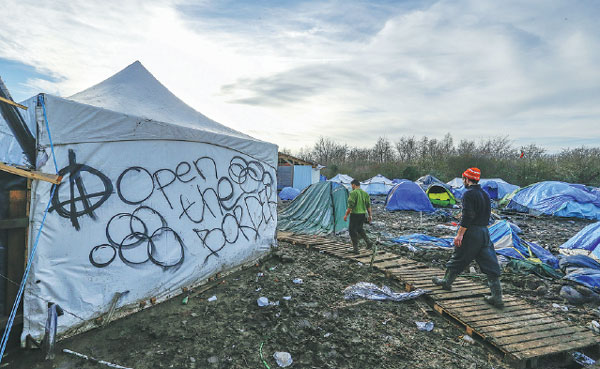'Running out of time', EU warns
Ministers prepare up to two-year suspension of Schengen rules
The European Union on Monday edged closer to accepting that its Schengen open-borders area may be suspended for up to two years if it fails in the next few weeks to curb the influx of migrants from the Middle East and Africa.
Shorter-term dispensations for border controls end in May. EU migration ministers meeting in Amsterdam decided they may be extended for two years - an unprecedented extension - because the migrant crisis probably will not be brought under control by then, according to the Dutch migration minister, who chaired the meeting.
|
Migrants walk in a muddy field at a camp for migrants and asylum-seekers in Dunkirk, France, on Monday. European Union migration ministers discussed the influx of migrants at a meeting in Amsterdam on Monday. Yves Herman / Reuters |
Some ministers made clear such a - theoretically temporary - move would cut off Greece, where more than 40,000 people have arrived by sea from Turkey this year, despite a deal with Ankara two months ago to hold back an exodus of Syrian refugees.
Greek officials noted that closing routes northward, even if physically possible, would not solve the problem. But electoral pressure on governments, including in the EU's leading power Germany, to stem the flow and resist efforts to spread asylum seekers across the bloc are making free-travel rules untenable.
"We are running out of time," said EU Migration Commissioner Dimitris Avramopoulos. He urged states to implement agreed measures for managing movements of migrants across the continent - or else face the collapse of the 30-year-old Schengen zone.
But the Dutch Migration Minister Klaas Dijkhoff said time has effectively already run out to preserve the passport-free system. It has allowed hundreds of thousands of people to make chaotic treks from Greece and Italy to Germany and Sweden over the past year.
Border controls
"The 'or else' is already happening," he said. "A year ago, we all warned that if we don't come up with a solution, then Schengen will be under pressure. It already is."
Under pressure from domestic opinion, several governments have already reintroduced controls at their borders with fellow EU states. Those controls should be better coordinated, said Dijkhoff, whose government last year floated the idea of a "mini-Schengen", which critics saw as a way for Germany and its northern neighbours to bar the influx from the Mediterranean.
But the EU executive and leading power Germany are bemoaning a nationalistic tide that could put at risk not just Schengen but the euro and even the foundations of the EU.
In that light some diplomats saw the talks in Amsterdam as another scare tactic from those refusing to close the door to migrants.
"The discussion is full of these apocalyptic predictions," one said. "But things won't really change in two months."
Danish parliament expected to allow seizing of valuables
The Danish parliament is expected to pass measures on Tuesday to deter refugees from seeking asylum, including confiscating valuables to pay for their stay, despite protests from human rights groups.
The measures, which also include delaying family reunification to three years, are the latest sign that the Nordic welcome for refugees is waning as large numbers flee war in Africa and Middle East in what is becoming Europe's biggest migrant crisis in decades.
The "jewelry bill" is the latest attempt by the minority center-right government to curb immigration to a country that took in a record 20,000 refugees last year.
Under the bill, refugees could keep possessions amounting to $1,500, raised from $440 after criticism from human rights organizations. Valuables of special emotional value such as wedding rings will be exempt.
The Liberals government has just 34 out of 179 seats in Parliament and depends on support of right-wing parties, including the anti-immigration Danish People's Party, to pass laws.
A poll showed 70 percent of voters see it as the most important issue, according to the daily paper Berlingske.
Reuters - AP



















